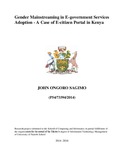| dc.description.abstract | The motivation behind this study was to determine and see how the concept of gender mainstreaming could impact the adoption of e-government services in Kenya, which like numerous other developing nations, the Kenyan e-government activities has confronted various difficulties since its commencement in 2004. E-administration programs have been started by a few governments utilizing ICTs to make taxpayer driven organizations more available to citizens by availing them electronically, now and again with an express system to provide guarantee that these services reach women and men who confront hindrances in accessing them.
While contemplates by researchers keep on outlining the most notable adoption techniques, and also different systems and models for understanding adoption, this study uses and depends on Technology Acceptance Model to investigate the reception of e-government services in the Siaya County of Kenya, and presents justifications for the need of both men and women to have same access to e-government information and administrations so as to encourage its adoption.
To accomplish this, three research inquiries and six theories were utilized. A distinct descriptive study was used that centered on the number of inhabitants in Siaya County who were 18 years and above. A simple random sampling procedure was utilized to collect data from the populace and a questionnaire was utilized to gather information from the participants. Examination of the demographic information was done using SPSS version 20 to test the exploration theory utilizing graphic measurements of recurrence tallies and rate. The real findings of the study concerning gender uncovered that this variable assumes a noteworthy part in E-government adoption. This is shown by a positive correlation that was found after a regression done on gender orientation in connection to E-government adoption. The study uncovers that men are potential adopters of e-government services after cross classifying gender with different elements, for example, e-administrations conveyance, ICTs access, Perceived usefulness, perceived ease of use and design for E-governance Policies and Strategies
It is expected that the discoveries of this study will help the Kenyan government and other concerned stakeholders pick up a superior comprehension of mainstreaming gender orientation keeping in mind the end goal to induce the reception of e-government services by empowering them to arrange and outline e-administration approaches and design e-governance policies and strategies more successfully. | en_US |

